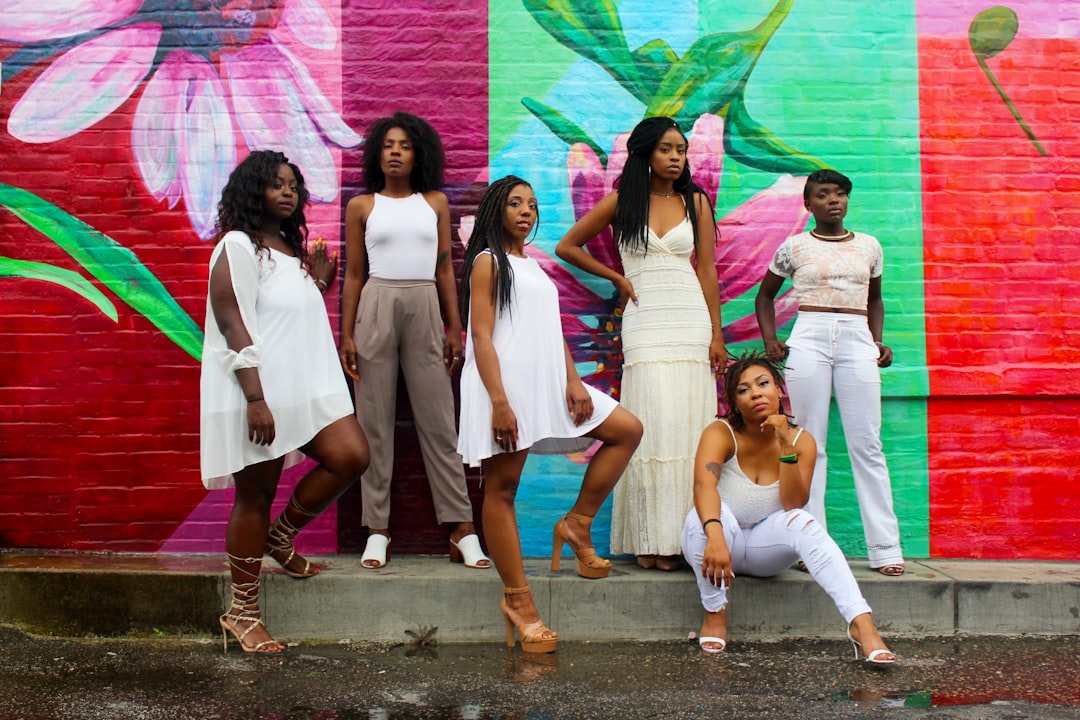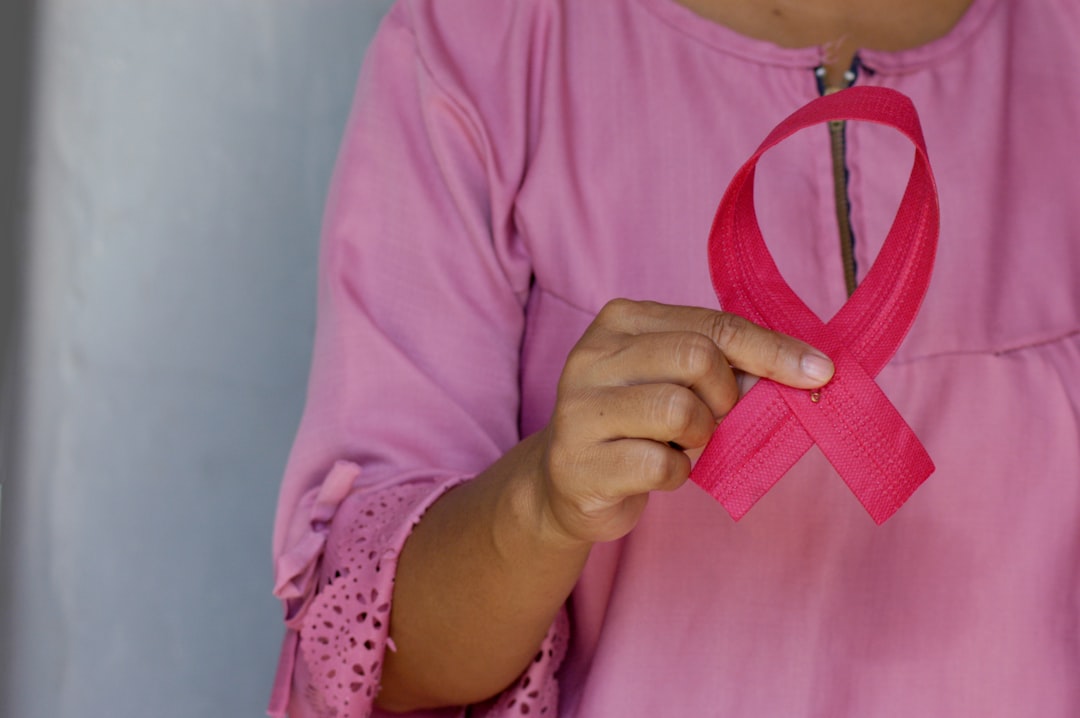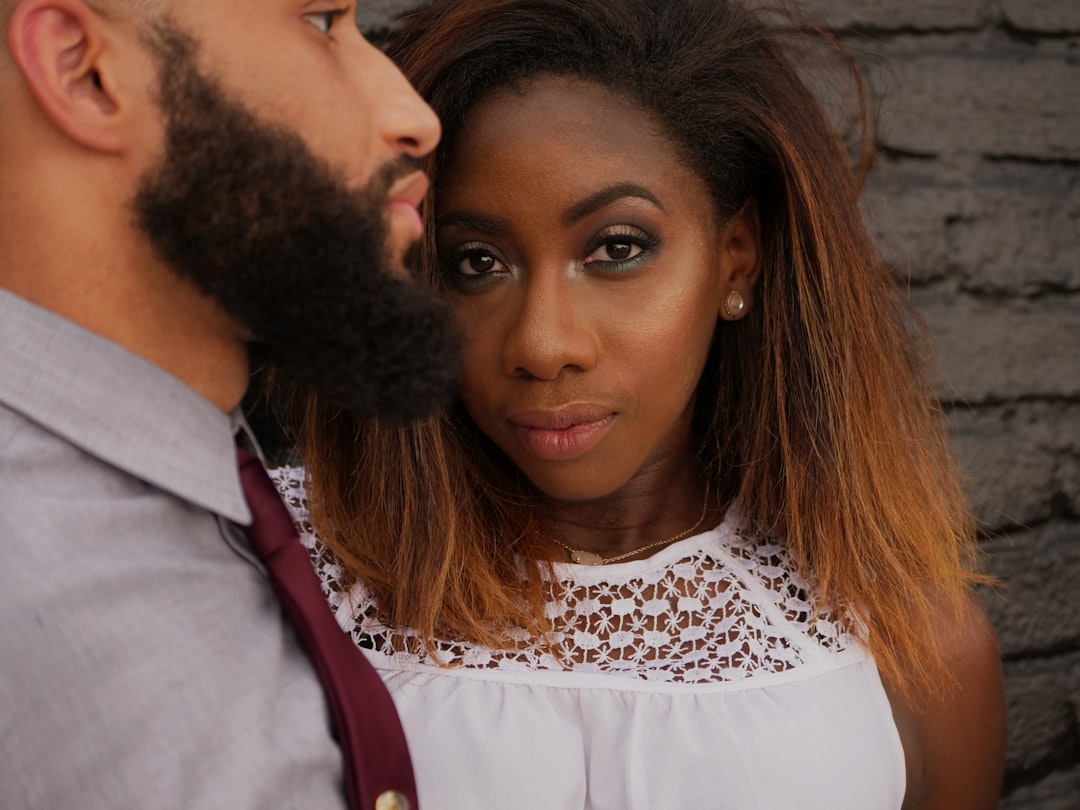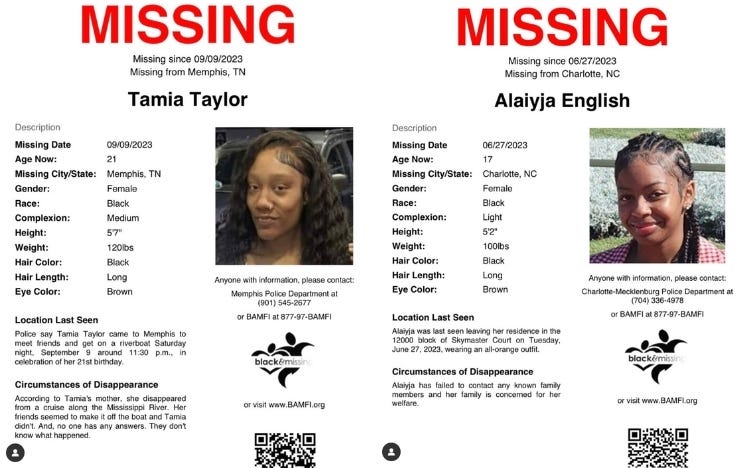New poll reveals Black women's top issues, biased breast cancer testing, backlash from Black men online
Plus, new bill proposes a federal office for missing and murdered Black women, attack at a beauty supply store sparks London protests, new films and TV shows on our radar, reclaiming "hoochie" & more.
Greetings! Please take a quick moment to take this short reader survey if you haven’t already. Understanding our readers will help us figure out the best, most aligned ways to grow the newsletter audience and income (which means more resources, more team members, more impact!)
MUST READS
Black women identify top issues ahead of 2024, issue call to action in new poll
The Hill, Cheyanne M. Daniels

“The survey found that 55 percent of Black women identified systemic barriers as obstacles to economic success and upward mobility, including racism and discrimination, economic inequality that favors the wealthy and a lack of job opportunities.
Black women in the survey also said they feel a recession, crime and violence and climate change will impact their lives in the future. Reducing gun violence, protecting reproductive freedom including abortion rights, and standing up against racism and discrimination make up Black women’s top three issues.”
According to a new survey from The Highland Project, 61 percent of Black women are dissatisfied with the direction of the country, especially in regards to the economy, racism, gun violence, reproductive rights, and climate change. Daniels’ article considers this in the context of the upcoming 2024 presidential election and features individuals urging President Biden and Democrats to “engage with” Black women by listening to their issues ASAP and offering “caregiver-centered” agendas—actionable plans for Black women who’ve cared for not only their families and communities, but the nation at-large. As Daniels writes, “the poll found that Black women’s support for Biden has decreased by 20 points since his election, with 69 percent of Millennial and Gen Z voters reporting they are dissatisfied with the direction the country is going.”
A popular breast cancer genomic test underestimates risks for Black women
STAT, Nathalie McDowell Johnson, M.D., FACS

For at least the past 15 years, most health systems across the U.S., including prestigious cancer centers, offer women with early-stage ER+ breast cancer a genomic test that analyzes the signals of 21 genes in their tumor to determine the risk of recurrence. The resulting “risk score” influences a clinician’s treatment recommendations, including whether to prescribe chemotherapy.
However, recent research has concluded this commonly used 21-gene recurrence score is less accurate for Black women. In particular, many Black women are being told they have a low risk of their cancer returning after treatment, when they may have an aggressive form of cancer that requires more rigorous therapy. The reasons for this are not surprising: Black women with breast cancer are underrepresented in research trials, and this remains evident in genomic trials and treatment paradigm development as well.
In an op-ed for STAT, surgical oncologist Dr. Nathalie McDowell Johnson explained how a common test used to determine the risk of recurrence of early-stage ER+ breast cancer fails to accurately assess Black women. Keep in mind that Black women are already disproportionately impacted by this disease, dying at a much higher rate (41% higher) than their white counterparts despite having similar incidence rates. What stood out most to me about Dr. Johnson’s essay is that data showing the test’s inefficiency and discrepancies has been known since 2018. That means for the past five years, many Black women have been misdirected for a debilitating disease that we’re more likely to die from and be diagnosed at a younger age with a more advanced stage of the disease.
I also appreciate how relatively comprehensible this essay is. I don’t have a medical background or know-how and was still able to understand the significance of this test and the implications of its inadequacy. Plus, Dr. Johnson tied in a couple quotations from non-medical contexts that really helped to paint the big picture. Case in point: “We women of color have knowledge. But as motivational speaker Eric Thomas says, ‘Knowledge isn’t power. Applied knowledge is power.’ We have to apply this knowledge to make substantive change.”
‘Brickgate’ revives an age-old argument between Black men and women
NBC News, Claretta Bellamy and Uwa Ede-Osifo
“Brickgate” points to a familiar pattern of backlash hurled at Black women when they publicly denounce harm from Black men. And while it appeared to be an isolated act of violence, the back-and-forth from detractors and supporters of Osman represents long-simmering tensions between Black women and men that now play out on social media. The source of that continued tension, experts say, is unaddressed anguish from both Black men who deal with rigid views of masculinity and Black women who feel neglected in light of demeaning stereotypes pinned to them.
NBC News reporters Claretta Bellamy and Uwa Ede-Osifo dove deep into “long-simmering tensions between Black women and men,” threading incisive reporting and nuanced context with apt examples from politics (Anita Hill’s accusing then-Supreme Court nominee Clarence Thomas of sexual assault in 1991) to music (Megan Thee Stallion being shot by Tory Lanez in 2020) to books (the Black women’s “literary renaissance” in the 1970s that included titles grappling with this theme, like in “The Color Purple” and “I Know Why the Caged Bird Sings.”) Bellamy and Ede-Osifo also noted the disproportionate rates of domestic violence and gendered racial stereotypes that Black women experience.
Several professors of Black studies, gender studies, and human developments also shared where they feel the tensions stem from and why they persist, like how marrying to strengthen previously severed family units led to the internalization of destructive Western understandings of patriarchy. (I also discovered The Black Man Project, an organization that provides group therapy for Black male youth.) Their takeaway? An ongoing, in-depth conversation is between Black women and men is long overdue.
MORE RECOMMENDED READING
Democrats Propose Bill to Establish DOJ Office for Missing and Murdered Black Women
Vice, Alexis Johnson
“The proposed federal office calls for research that involves local community engagement, incorporating focus groups and interviews with Black women and girls with lived experience. It also includes a focus on data collection efforts to build a tracking and reporting infrastructure for missing cases.”
Deaths of 2 models found in downtown L.A. in same week appear to be unrelated, LAPD says
The Los Angeles Times, Summer Lin
“Coats’ mother, Sharon Coats, told The Times on Tuesday afternoon that she believed her daughter was killed because of how her daughter’s bedroom looked when she was found.”
Related: 2 Black Models Were Found Dead In Their Los Angeles Apartments. Will They Receive Any Justice?
Stolen Girls: The untold story of the Leesburg Stockade Girls
CNN, Randi Kaye
“‘All of you are under arrest,’ Reese remembers the officer telling the children, all of whom, she said, were between the ages of 12 and 15. And then, without much ceremony, several of the girls were rounded up and taken to a stockade in Leesburg, Georgia, 23 miles outside of town. They would remain jailed there nearly 60 days.”
Kelechi Okafor: “The Peckham Shop Protest Proved Why Showing Up For Black Women Matters”
Refinery 29 Unbothered UK, L’oréal Blackett
“It became glaringly clear to Okafor, and all the Black women watching the news unfold, that much of the public had quickly determined who the victim was in this scenario — and it wasn’t the Black woman with hands around her neck.”
Related: Here’s why tonnes of Black women are boycotting certain London hair shops
Drake using Halle Berry’s photo to promote himself may be legal. But it's far from right.
MSNBC, Evette Dionne
“It doesn’t matter how famous she is, how often her name’s been mentioned in hip-hop songs or how gracious she’s been to those who’ve evoked her in their lyrics. To rob Berry of that right is just another means of objectifying her, divorcing her voice from her body and subjecting her to a scrutiny she never sought.”
Black Women Having All the Fun: ‘Bongos’ and ‘You Wish’ Celebrate the Joy of Black Sisterhood
Ms. Magazine, Janell Hobson
“Both songs contain explicit lyrics about their sexual bravado, but one video leans into the hypersexual spectacle of Black women’s bodies, while the other explores the quirkiness of said bodies. This is not to suggest one is ‘more appropriate’ than the other—far from it! We are witnessing the full spectrum of Black women rappers engaging in pleasure and joy.”
Kristen Welker Makes Historic Debut As Host Of "Meet The Press"
Essence, Melissa Noel
“Welker made history as the first Black journalist to take the helm of the Sunday morning public affairs program, which has been on the air since 1947, making it the longest-running program on television. She is also only the second woman to moderate ‘Meet The Press.’”
TV rarely shows Black experiences at work. ‘The Other Black Girl’ is changing that.
The Washington Post, Janay Kingsberry
“But ‘I can’t think of any show where the primary thing about the Black woman is her career and how she navigates that workspace on a regular basis or as the focus of the show,’ said Robbins, who co-edited ‘Race & Ethnicity in American Television: Voices and Visions that Shaped a Nation,’ a two-volume encyclopedia published in 2021 that examines five decades of racial representation in the media.”
How bibliocounseling can create space for Black girls and girls of color to connect in school
KQED, Marlena Jackson-Retondo
“For Tillery’s first bibliocounseling group, the topics were clear: teen dating, teen relationships and teen intimate partner violence. Tillery and her colleagues had heard a lot of concerns from students related to these issues.”
How podcasts about R. Kelly played a pivotal role in elevating Black survivors’ stories
The 19th, Candice Norwood
“Barner wanted to explore how the podcast format in particular allowed Black hosts to unpack the media’s complicity and silence on Kelly’s crimes, while also providing content focused on the people most affected.”
The Black women of Sisters in Medicine are helping one another make it in health care
The Philadelphia Inquirer, Nate File
“‘The hope is that Sisters in Medicine will create a network and an opportunity to connect [with] other women that may have similar experiences … [and] to work collaboratively to uplift and support each other,’ she said.”
Maternity ward to close as family calls for justice in death of Black mother
NBC News, Zinhle Essamuah, Kayla Steinberg and Hannah Rappleye
“‘You got to think how many Aprils was out there before this and how many Aprils can be out there after this,” he said. ‘I’m gonna fight for her and every other Black woman that ever had to do something like this.’”
Hoochie Mamas Have Long Been Villainized in Pop Culture, But Black Women Are Reclaiming the Term
Teen Vogue, Kailynn Johnson
“‘There’s freedom in being able to call yourself something that many people on the outside of the culture might have considered a negative,’ Truly says. “Being able to be sexually free and liberated is so important to our culture.’”
The Cut, Angelina Chapin
“‘I was betrayed,’ she says, wiping a tear from behind her glasses. ‘I shouldn’t have ramifications at 33 from a product I used at 5.’ Over the past 11 months, hundreds of women like Denham Hughes have been linking their health issues to hair straighteners on the heels of new research from the National Institutes of Health.”
Celebrating 50 Years of Hip-Hop (With Drew Dixon and Janell Hobson)
Ms. Magazine, Michele Goodwin
“I think that a lot of people became very rich feeding mainstream America a violent rock-and-roll version of Black rebellion that was safe because it was rebellious and self-destructive. Rebellious, but absolutely undermining the fabric of our own community, our own families, our own relationships, and it kind of got by us because it was a rejection in some ways of what now is a quite ironic Bill Cosby model of respectability, which I think was a needed pushback.”
A Lot to Remember—And to Correct
The Atlantic, Imani Perry
“If the organizers of the mid-20th century imagined the ideal of freedom as including multiple dimensions—not just voting rights and access to higher education, but also freedom from sexual violence, reproductive rights, access to health care, and a living wage—we must insist upon the same in the present moment.”
‘We knew that she would have a bright future.’ Why are so many babies dying in Ohio?
The Columbus Dispatch, Amelia Robinson
“Black babies accounted for 63% of infant death in Franklin County the first quarter of 2023, but only 34% of births, according to the city of Columbus' infant mortality report.”
ON OUR RADAR
Book — For the Culture: Phenomenal Black Women and Femmes in Food: Interviews, Inspiration, and Recipes | By Klancy Miller
Film — Donyale Luna: Super Model | now playing on HBO
Film — Invisible Beauty | Now in theaters
TV — Young Love | now playing on Max
TV — The Other Black Girl | now playing on Hulu
Music — Black Rainbows | Corinne Bailey Rae’s new album
HAVE YOU SEEN THESE BLACK GIRLS & WOMEN?
Please visit Black and Missing Foundation on Instagram to view these and other missing persons posters. We’re testing out this format to save digital space as opposed to embedding each Instagram post in the newsletter.








